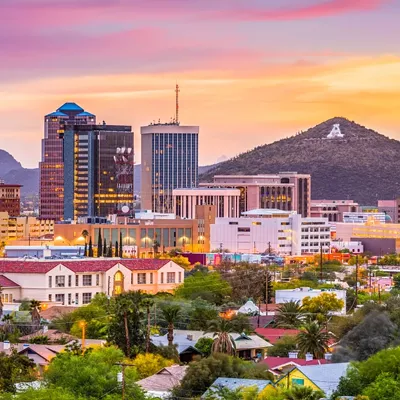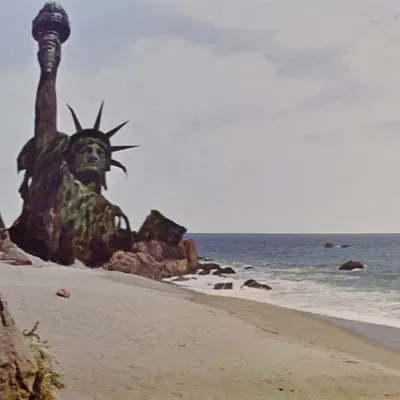The Burkes are sitting at a round table on their front porch, amidst the cacophony and a thickening haze. Nicholas, a noted sculptor, narrows his eyes. "You should see it during the summer when school's out," he says. "It's like a different place around here."
On such mornings, they can pretend that the maelstrom next door is just a fuming chimera. But this is not one of mornings. "The noise is constant," Nicholas says. "Once, for fun, I counted back-up beeps. One bus beeped 270 times."
Things weren't supposed to be this way. When the Burkes bought their house back in 1992, they say, the Amphitheater School District's bus barn, stretching behind chain link directly across the street, was mostly a maintenance yard with little noise. What bus traffic existed was on nearby Pastime Road.
But that all changed in 1998, when the Burkes received a portentous letter from the district. "Dear Neighbor." it said, "Because you own property in the neighborhood, I am writing to invite you to a public review of the Amphitheater School District's plans for expanding its Transportation Facilities ..."
Nicholas Burke remembers that meeting well. He says residents were told there would only be 80 buses operating from the yard. They'd run for 90 minutes in the morning, and another 90 minutes in the afternoon. "But now, there are 120 buses, and they run all day long," he says. "It's enough to drive you crazy."
One day, he snapped and marched over to the depot to express his displeasure. "The manager stomped out and told me they had a business to run," Burke says. "I figured they probably called the police or something."
To be fair, officials have diligently tried to reduce bus idling times and educated their drivers on neighborhood etiquette. Beyond that, however, the district sends hopelessly mixed signals.
If you ask Douglas Aho, Amphi's executive manager of operational support, he'll tell you the buses will eventually be gone. "We know the neighbors want us out," he says. "And why not? It's not conducive to a neighborhood. If you don't see the buses, you smell them."
But if you ask Kent Paul Barrabee, president of the Amphi Governing Board, he'll tell you that moving the bus barn "is not our highest priority."
Besides, says Barrabee, the district has few options, although the district has met with city officials over some land deal giving the buses a new home. Those negotiations went nowhere.
Now Amphi is stuck, says Barrabee. "A lot of it depends upon what land would be available, and it's very difficult to find an alternative location." Regarding negotiations with the city, "that carrot didn't turn out to be as edible as it first appeared."
Others, such as the Burkes, suggest that Amphi is simply touting failed negotiations as an excuse for doing squat. John Updike, the city's real estate administrator, didn't return a call seeking comment.
Excuses only go so far, says Michael Ray, president of the Limberlost Neighborhood Association, which surrounds the bus barn. In the fall of 2003, Ray experienced the Burke's plight first-hand, during bus rush hour. "It was very sobering," he says.
Soon, the association was meeting with Amphi officials, and members drafted letters detailing air pollution, noise pollution and public safety concerns. "And the response from Amphi was what we expected," he says. "They came back and told us there were no violations of state standards for diesel particulates. That was part of their defense."
Ray is assistant to the dean at the UA library, and he knows bureaucratic bunk when he sees it. Such official dirty dancing does little to help depot neighbors, he says. "It's a particularly huge problem when there's an inversion layer. Particulate matter hangs like fine dust in the air. I live two blocks away, and anytime it comes my way, it's terrible."
Limberlost residents with asthma are often forced indoors, and folks regularly shut down swamp coolers to keep diesel fumes from invading their homes.
But don't expect any costly solution soon, says Barrabee. "Our budget is so pushed," and a bond to finance a move isn't feasible
Blame for the shortfall might fall upon the district itself, which spent a notorious fortune fighting to build its high school in pygmy owl habitat. Nor should we forget all those sleazy, disastrous land deals orchestrated by onetime Amphi real estate hustler Bill Arnold in the 1990s.
Regardless, such analysis won't help folks in Limberlost breath any easier.
Oddly enough, the same doesn't apply to the far more affluent neighborhoods of Oro Valley, where residents fought off an Amphi plan to build a bus barn in their midst. The defeat of that notion sparked the expansion of the Limberlost depot. "I think many facets of this situation are related to social class," says Michael Ray. "This is a neighborhood with a 70 percent rental rate and a lot of absentee landlords."
In turn, property owners such as Burke say the buses are battering property values further. However, Barrabee points out that "(the bus depot) was already part of the property value" when many purchased homes in the area. Still, even the most astute real estate prognosticator could hardly have prophesized the Burke's current predicament back in 1992. Who then knew that 120 buses would eventually be rerouted onto to Roger Road, creating a torturous parade day-in, day-out?
Barrabee says he's not oblivious to the resulting aesthetic and health concerns. "Obviously, a bus barn isn't desirable in a neighborhood," he says. "But we've tried to determine whether it's an obvious health hazard, and it isn't." Aho says the district did have an outside company perform air quality tests, "and we we're well inside Pima County guidelines" set to federal standards.
That's rather cold comfort, according to Janice Nolen, director of national policy for the American Lung Association in Washington, D.C. "Just being within the federal guidelines is not necessarily such a good thing," she says, pointing out that EPA limits for short-term diesel smoke "are much too high. They're not really protective of public health.
"Diesel smoke is the source of particulate pollution. Particulate pollution has been linked to the triggering heart attacks and other diseases, and to the shortening of life."
Then again, maybe that's exactly what Amphi has in mind, says Nicholas Burke. And he's only half-joking. "I get the feeling they're just waiting for us all to die, and then they won't have to do anything," he smirks, amidst the acrid scent of endless rolling buses.









